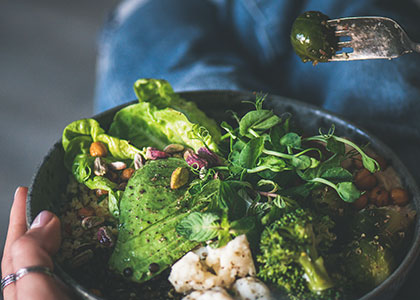
10 Surprising Anti-Inflammatory Foods
By Claire Georgiou, Reboot Naturopath, B.HSc ND
Inflammation is the body’s own crucial defense mechanism against infections, environmental toxins, injury and stress; inflammation helps to protect and repair damaged tissue from these contributing factors. While in comparison, chronic on-going whole-body inflammation causes a whole myriad of long-term health problems such as arthritis, stiffness, reduced mobility, heart disease, cancer, skin conditions, fatigue, diabetes, Alzheimer’s disease and more. Learn more on what inflammation really does to our bodies and what lifestyle factors increase inflammation.
Eating plenty of anti-inflammatory foods can have a large impact on reducing our circulating inflammatory cytokines to help reduce systemic inflammation and keep our bodies in good health. Flooding all body tissues with so many anti-inflammatory phytocompounds has an immense effect on all things inflammatory.
Most people have become well-versed on the benefits of turmeric and its powerful anti-inflammatory effects along with other anti-inflammatory foods such as berries, wild fish, pineapple, nuts and other helpful anti-inflammatory compounds and anti-inflammatory nutrients.
So here is a list of beneficial foods that people may not identify as being anti-inflammatory:
Dark Chocolate
Dark chocolate is surprisingly loaded with nutrients and antioxidants, particularly a compound known as a flavonoid. Flavonoids modify the production of pro-inflammatory cytokine and help to reduce other inflammatory pathways. Studies suggest that the regular or occasional consumption of cocoa-rich compounds exerts beneficial effects on blood pressure, insulin resistance, vascular damage, and oxidative stress.
Cruciferous Vegetables
What can’t this family of vegetables do? They are full of anti-inflammatory compounds that support good health. Sulforaphane compounds that are found in cabbage, broccoli, cauliflower, kale, Brussel sprouts have been shown to reduced inflammation in arteries. These vegetables have also been shown to reduce inflammation throughout the body and protect us against cancer and other inflammatory diseases.
Tea
Matcha tea is the most nutrient-rich green tea. Matcha has up to 17 times the antioxidants of wild blueberries, and seven times more than dark chocolate. Tulsi is another tea loaded with anti-inflammatory antioxidants and other micronutrients that support immune function and heart health. White, black and green all possess potent anti-inflammatory benefits. The catechin polyphenols found in tea are potent natural anti-inflammatory compounds that have been shown in numerous studies to reduce the risk of heart disease and cancer.
Sesame Seeds
A recent study indicated that these little seeds were able to slow cartilage degeneration, reduce oxidative stress, and improve inflammatory biomarkers. In this study those who had taken the sesame seed had significantly less pain and better function than those taking the drug.
Cloves, Ginger, Rosemary
When people think of anti-inflammatory spices and herbs they think turmeric but these herbs and spices also have some really wonderful anti-inflammatory benefits. In one study, regular daily consumption of these spices, only consumed in small normal quantities, proved significant reduction was seen in inflammation.
Other spices that offer an array of anti-inflammatory benefits include nutmeg, cinnamon, cumin, paprika, cayenne, cloves, pepper and more. Although in one study cloves top the list as the best anti-inflammatory spice.
Fermented Foods
Fermented foods such as kombucha, kefir, sauerkraut, miso, other traditionally cultured foods and all things fermented provide healthy bacteria that will optimize your gut thus supporting a healthy immune system which helps to reduce inflammation in the body.
Shiitake Mushrooms
Shiitake mushrooms contain strong compounds such as ergothioneine, which has the ability to reduce inflammation. These mushrooms have a balancing effect on immune health and will down-regulate excess inflammation. These are well known to help reduce inflammatory chronic diseases such as atherosclerosis and cancer.
Garlic and Onions
Garlic has been shown to work similarly to NSAID pain medications, by scaling down the pathways that lead to inflammation. Onions contain similar anti-inflammatory chemicals, including the phytonutrient quercetin and the compound allicin, which breaks down to produce free radical-fighting sulfenic acid.
Coffee
Coffee for many years was always considered a big health no-no. Coffee has been shown to offer a myriad of health benefits due to its naturally occurring compounds such as polyphenols, when consumed in small to moderate amounts. Coffee may help to reduce diabetes and researchers believe it is due to its potent anti-inflammatory effects. It is important to note that coffee may not be right for everyone. I highly recommend when drinking coffee to consume organic. It is also important to note that higher coffee drinkers had been shown to have an increase in inflammatory markers.
Tomato Sauce (and Juice!)
Tomato sauce often gets a bad rap but consuming a healthy homemade tomato sauce is certainly easy enough to do and offers an array of health benefits due to the concentration of lycopene, a potent antioxidant found in tomatoes. Tomato juice has also been shown to reduce inflammation due to the concentration of the phytonutrients in cardiovascular risk subjects in one study. Some people with arthritis may be sensitive to nightshades.
Which of these anti-inflammatory foods is most shocking to you?